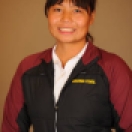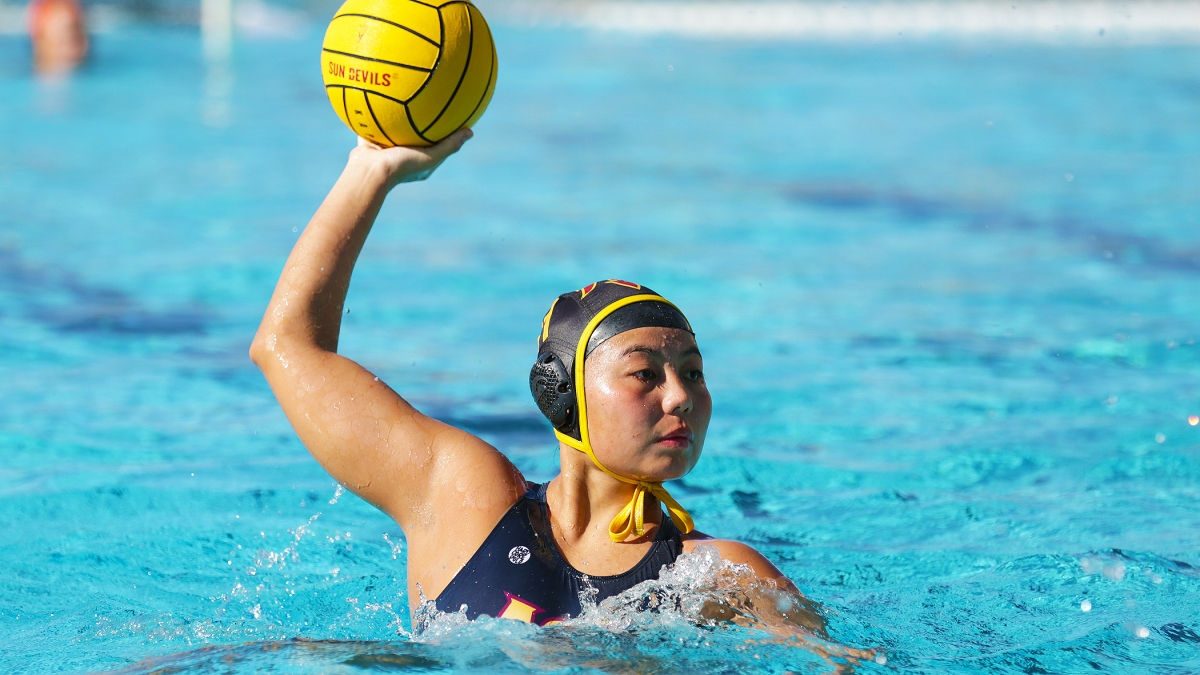Water polo has been a huge part of Ao Gao’s life since her elementary school days in Beijing.
The sport took her away from home to a training camp with other young girls.
It put her on the world’s biggest stage when she played for the Chinese national team in the 2008 Olympics in her hometown, and again four years later in London.
It sent her to venues all over the world, fueling a passion for travel that still exists.
It stressed her almost to the breaking point.
And it drove her to seek more from life — including slipping quietly away from the Chinese team so she could pursue a journalism degree at Arizona State University.
The competition built her up and tore her down.
And soon, her competitive life may be over. At age 25, Gao is playing in her last season on the ASU team.
With the 2016 Olympics in Rio de Janiero coming up, she would like another trip to the world games.
“It would be a good transition for me to still go to the Olympics — not as an athlete but as a reporter,” she said.
“Sports can be a part of my life, but journalism I will do for my lifetime.”
Olympics 'like a dream'
Gao started as a swimmer but switched sports when her mother, a stickler for academics, found a good school that had a water polo team.
It turned out to be a boon for the young athlete.
Her country was gearing up for the 2008 Olympics to be held in Beijing, and in 2005, when Gao was 15, she went away to year-round training camp for the women’s national team. The competition was tough, and it was hard to be away from her mother, who was a single parent.
“You’re always making friends and then it’s sad to see them leaving,” Gao said. “They started with 100 girls and got down to 13. And when you play with a lot of girls there is always a lot of drama.
“I was always the youngest and I kept thinking, ‘Don’t do anything stupid.’ "
Gao had just turned 18 when the 2008 Olympics brought the world to Beijing.
“It was like a dream,” she said of that time. “It didn’t hit me until the opening ceremony. You’re walking on the track seeing so many spectators, even though you can’t see much because the lights are everywhere.”
Gao said the hometown games were very moving for the Chinese athletes.
“We were all emotional. Not just water polo — it was every sport,” she said. “You see those moments every day, losing and winning. And even though we didn’t know the other Chinese players, I remember we just cried so easily.”
Her team came in fifth, and after the games, it was back to nonstop training with the national team.
But Gao was getting burnt out. She was also starting to think about more than water polo. Gao was sent to play in the Australian water polo league for six months, and there a teammate told her to reach out to American colleges.
So she started sending emails and working on her English skills.
“I was 19. I thought, ‘I can’t do this forever.’ My mentality was not there anymore,” Gao said.
Still, she excelled during the 2010 World Cup, scoring 16 goals for the Chinese team, which won the bronze medal.
After that, Gao left the training grind for a break, telling her coaches she was sick. Back home, she took classes and prepared to take the SAT. By the spring of 2011, she had decided to come to ASU.
But the pull from her national team hadn't relented. After months away, her coaches were calling her.
Gao returned to the national team for a few days, wanting to see her teammates one last time. She didn’t want to face being pressured to stay in China, so she didn’t tell anyone she already had a plane ticket to America.
It was a leap of faith. Gao didn’t know if she would be eligible under NCAA rules to play college water polo, or whether she had the English skills to take classes. She spent the fall of 2011 improving her English, but it still was a difficult transition.
“I could barely understand my professor. When he said something in class, everyone laughed and I thought, ‘What happened?’ ” she said.
She was playing on the ASU team in the spring of 2012 when the Chinese national team asked her to return for the 2012 Olympics in London that summer. Gao was torn.
“I agreed for my teammates," she said. "They were like my sisters.” But Gao told the team that after the Olympics, she was done.
“We came in fifth again. I thought I could help them to get a medal so their lives could be changed, but it was sad,” she said of the results.
When Gao returned to ASU after the Olympics, her life began to improve.
“I became more confident. I had something else outside of water polo. I had my teammates here. I go to church here. I have classes. I feel like my life is more balanced.”
Even though she was playing well Gao has been one of the Sun Devils’ best players. She had 43 goals her sophomore year while leading the team with 43 assists — the third-highest single-season tally in school history. She had 40 goals her junior year, and she earned All-America honors as a two-meter defender during her sophomore and junior seasons.
, Gao took off the 2015 season so she could concentrate on getting career experience in video production, and she graduated with a bachelor’s degree in three and a half years.
Gao has been one of the Sun Devils’ best players. She had 43 goals her sophomore year while leading the team with 43 assists — the third-highest single-season tally in school history. She had 40 goals her junior year, and she earned All-America honors as a two-meter defender during her sophomore and junior seasons.
, Gao took off the 2015 season so she could concentrate on getting career experience in video production, and she graduated with a bachelor’s degree in three and a half years.
Then she faced a difficult decision — whether to return for her final year of competition or leave ASU and pursue a master’s degree elsewhere. Then, the Walter Cronkite School of Journalism and Mass Communication launched its master’s of sports journalism degree, and everything fell into place for Gao to stay.
“I had been awhile since I trained, but I had come back before,” she said.
'An amazing inspiration'
At 25, Gao is by far the oldest member of ASU’s water polo team. Her teammates call her “grandma,” but she’s embracing her role as mentor.
“I enjoy seeing them get better,” she said of the other players.
Coach Todd Clapper said that Gao’s story has been an inspiration for the young team — on which 12 of the 18 players are freshmen and sophomores.
“It’s a great story of someone who came here and focused on a different kind of path from where she was headed in China, in terms of full-time training with the national team until she wasn’t able to play anymore and then trying to figure it out,” he said.
“She’s made the most of her opportunity here, and she’s an amazing inspiration.”
Clapper said that with the time off last season, he has seen a renewed enthusiasm in Gao.
“She could have one foot out the door, but she’s really helping our program,” he said.
The team has played several exhibition matches this season and starts regular-season play at 10 a.m. Saturday hosting Indiana University.
Gao is enjoying her last season, but she’s also looking ahead. She applied to be part of a Cronkite student team that will go to Rio in August to cover the 2016 Olympics, which could be a fitting bridge from her life as an athlete to the professional world.
Seeing the end of her competitive years is bittersweet.
“When you don’t have practice, you miss it. When you have hard practices, you say, ‘Why am I doing this to myself?’
“I’ll probably play with clubs for fun. I love the sport. It teaches me how to be strong and disciplined and mentally tough.”
Videos and top photo by Ken Fagan/ASU Now
More Law, journalism and politics

ASU experts share insights on gender equality across the globe
International Women’s Day has its roots in the American labor movement. In 1908, 15,000 women in New York City marched to protest against dangerous working conditions, better pay and the right to…

ASU Law to offer its JD part time and online, addressing critical legal shortages and public service
The Sandra Day O’Connor College of Law at Arizona State University, ranked 15th among the nation’s top public law schools, announced today a new part-time and fully online option for its juris doctor…

ASU launches nonpartisan Institute of Politics to inspire future public service leaders
Former Republican presidential nominee and Arizona native Barry Goldwater once wrote, "We have forgotten that a society progresses only to the extent that it produces leaders that are capable of…


